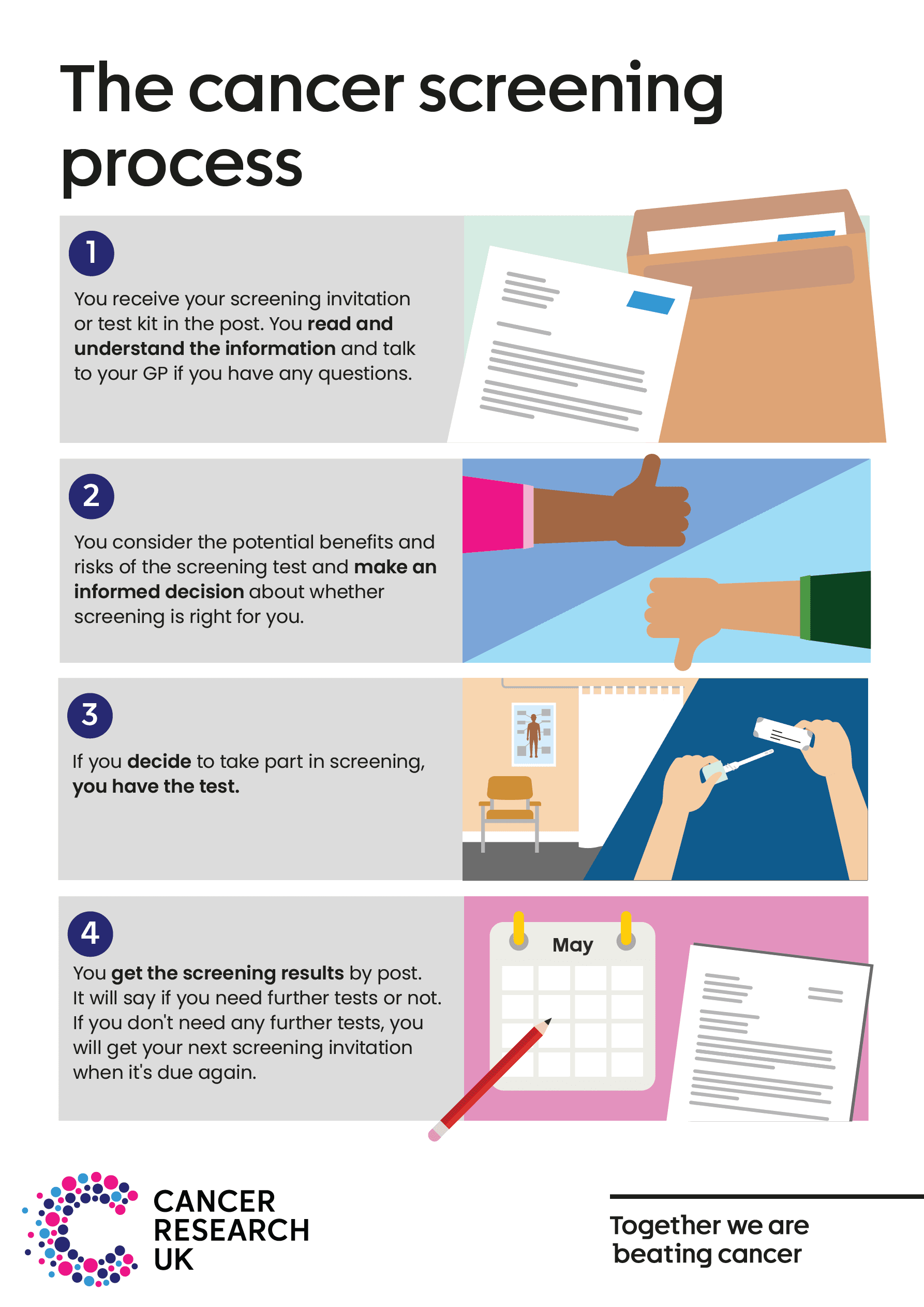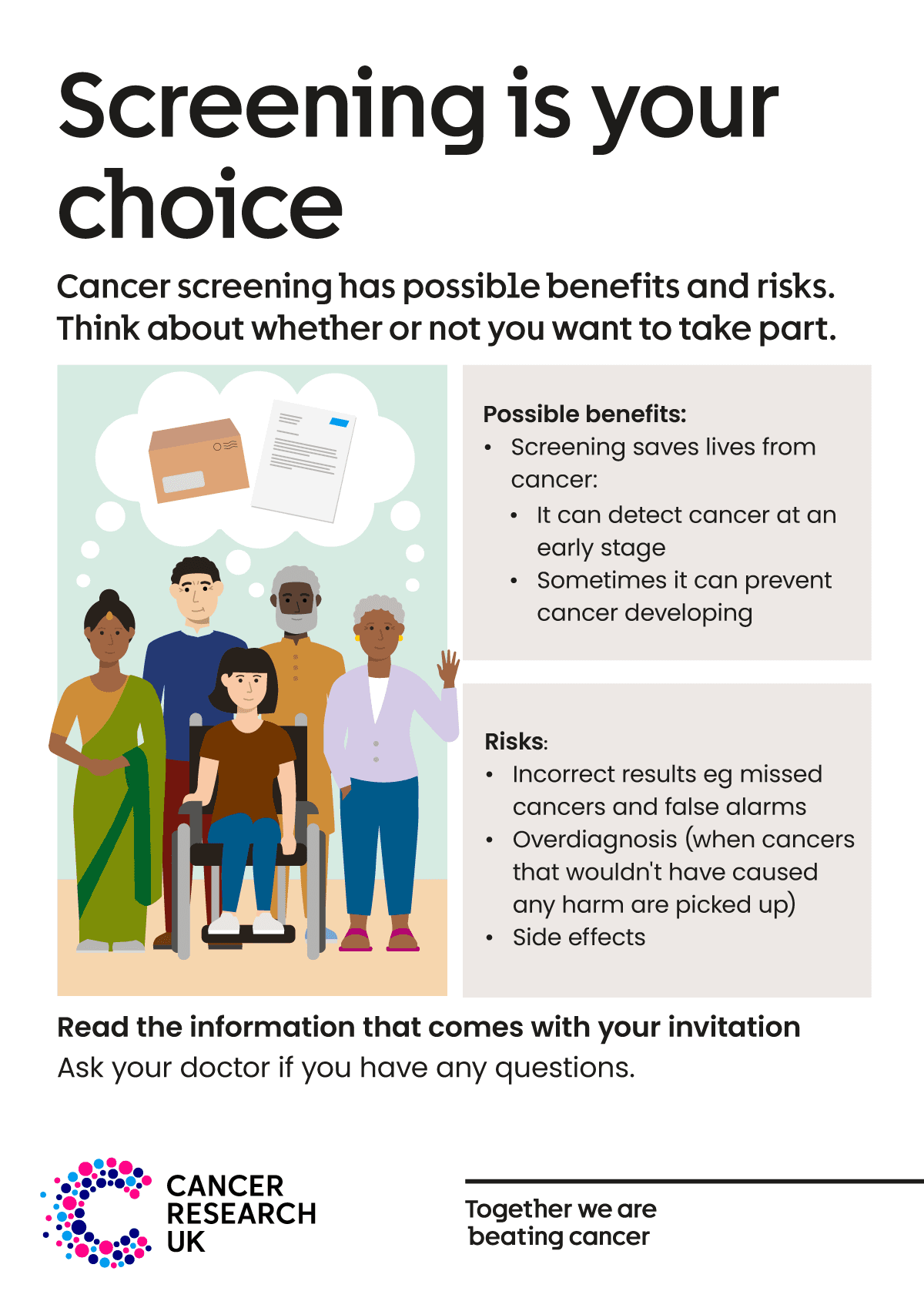Screening for cancer
Cancer screening is a test that looks for early signs of cancer in people without symptoms.
It can help spot cancers at an early stage, when treatment is more likely to be successful. Cervical screening can even prevent cancer from developing.
Cancer screening is for people with no symptoms. If you have symptoms, don’t wait for a screening invitation - tell your doctor as soon as possible.
There are 3 national screening programmes in the UK:
Bowel cancer screening is offered to people aged 50-74 in Scotland, Wales. and England. In Northern Ireland, bowel screening is offered to people aged 60-74.
Breast cancer screening is offered to women (including some transgender women), some transgender men and some non-binary people aged 50-70 in the UK.
Cervical screening is offered to women, some transgender men and some non-binary people aged 25-64 in the UK.
There is also a new NHS Lung Cancer Screening Programme that is being introduced for people at high risk of lung cancer. People will be invited if they are 55-74 years old and they currently smoke or used to smoke. It will take some time before this is available across the UK.
You will automatically be invited for screening if you are registered with a GP. Which screening invitations you receive depends on how your sex is recorded on the GP system. For transgender and non-binary people, any hormones or surgeries you’ve had will impact which screenings are for you. We have detailed information about screening for trans and non-binary people.
If you haven’t had a screening invitation when you think you should, contact your GP surgery. If you have lost your screening invitation letter or missed a screening in the past, you can still take part in screening. If you aren’t registered with a GP, you can find a local GP in England, Scotland, Wales and Northern Ireland.

You’ll get a letter inviting you to take part in screening with information about the test and what happens in the screening appointment. It will help you decide whether to take part. You can get more information about a specific screening test on our pages for bowel, breast and cervical screening. You can also ask your GP if you have any questions or are unsure about anything.
If you choose to take part in screening, you’ll have the test and get the results by post. The results won’t say if you have cancer or not, they say if you need further tests or not.
Most people don’t need any further tests after their screening. In this case, you will get your next screening invitation when it’s due. It’s still important to tell your GP straight away if you notice any unusual changes in the meantime.
Depending on what the test shows, you might be asked to have more tests. Most people who need extra tests aren’t found to have cancer.
Cancer screening isn’t perfect. It has both possible benefits (pros) and risks (cons). The balance of pros and cons is different for each type of cancer screening. That’s why it’s important to read the information that comes with your screening invitation. It can help you decide whether you want to take part.

The main potential benefit of screening is saving lives from cancer:
Screening can help to detect cancer at an early stage. If cancer is picked up early, it means that treatment is more likely to be successful and more people survive.
Some screening can prevent cancer from developing in the first place. Cervical screening can detect changes in the cervix which can be treated before they can cause cancer.
The main risks to screening are:
Screening can miss cancers (a ‘false negative’ result). That’s why it is still important to tell your doctor about any unusual changes or if something isn’t normal for you, even if you have had a screening recently.
Screening can also give people abnormal results when they don’t have cancer (a ‘false positive’ result). This can lead to unnecessary worry. It can also mean people have follow-up tests they don’t need, that may have side-effects.
Screening can pick up harmless cancers that wouldn’t cause any problems, even if they were never found (overdiagnosis). This is different from a false-positive result. People with these harmless cancers may have treatment they don’t need, as their cancer would never have caused symptoms.
Some screening tests can have risks or side effects such as pain or discomfort and light bleeding.
It is your choice whether to take part in screening.
Your screening invitation will include information about the possible benefits and risks of the test. You should read this information to help you decide and talk to your doctor if you have any questions. You can also ask your GP for details of screening helplines for breast cancer and bowel cancer.
We may all feel differently about the possible benefits and risks of screening. You should make the decision that is right for you.
Still have questions about whether screening is right for you? Read our news article on making the screening process work for you.
You can read about:
Last reviewed: 10 Nov 2022
Next review due: 10 Nov 2025

About Cancer generously supported by Dangoor Education since 2010. Learn more about Dangoor Education
What to ask your doctor about clinical trials.
Meet and chat to other cancer people affected by cancer.
Questions about cancer? Call freephone 0808 800 40 40 from 9 to 5 - Monday to Friday. Alternatively, you can email us.